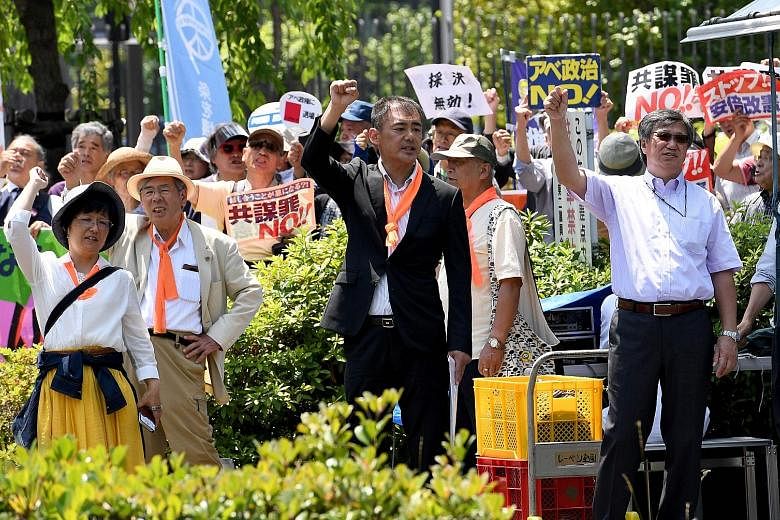A so-called "anti-conspiracy Bill" aimed at tackling plans to commit terrorism and other serious crimes has been passed in Japan despite fears of curbs on civil liberties.
This is Tokyo's fourth attempt to pass the contentious law, which punishes 277 crimes. Previous iterations covered some 600 offences.
The new law, which was passed yesterday and is expected to take effect on July 11, also covers the organised planning of offences such as drug trafficking, copyright violation and theft of forestry products.
The law has sparked concerns as it represents a departure from Japan's traditional criminal legal system, where charges can be brought against a suspect only after a crime has been committed.
Prime Minister Shinzo Abe said after the passing of the law: "The Tokyo Olympic Games are just three years away. This legislation will allow Japan to join hands with the international community in their efforts to prevent terror attacks."
Under the law, charges can be brought against a suspect if there is evidence of specific planning, including the surveying of a location. It includes provisions to cut short penalties for those who confess before a crime is committed.
If it is proven that one person in a group is involved in conspiring to commit a crime, all will be held responsible. Those planning more serious crimes face up to five years' jail; those conspiring to commit other crimes face up to two years' jail.
Japan expects to welcome a record 40 million visitors in 2020, when the Olympic Games are held, up from 24 million last year.
Japan expert Lim Tai Wei of the National University of Singapore's East Asian Institute said the recent terror attack in Manchester has given Tokyo the impetus to pass a law that can ensure the Olympics - seen as its "coming-out party" after the 2011 earthquake and tsunami - can be "executed with minimal problems and challenges".
However, many in the opposition and civil rights groups have accused Tokyo of conveniently using the marquee sporting event to justify the need for the controversial law.
While they acknowledge a need to guard against the terror threat, they argue that the law effectively gives the government a free hand to conduct surveillance on citizens.
Concerns have also mounted over how the new law will have a chilling effect on freedom of expression, despite Tokyo's reassurances that it will be used only to target terror groups and organised crime.
United Nations special rapporteur on the rights to privacy Joseph Cannataci and American whistle-blower Edward Snowden have both denounced the law.
A Kyodo news agency survey last month found the public split over the Bill; 39.9 per cent of respondents supported it, while 41.4 per cent opposed it.
Japan's opposition tried to block the Bill's passage despite the ruling Liberal Democratic Party's (LDP) overwhelming majority in both chambers of Parliament by filing a series of no-confidence motions. The opposition, led by the Democratic Party, insisted not enough time had been spent deliberating the Bill.
The LDP cut short the debate by skipping a vote by the bipartisan Upper House committee - a move portrayed by Japanese media as very rare and akin to a strong-arm tactic.

